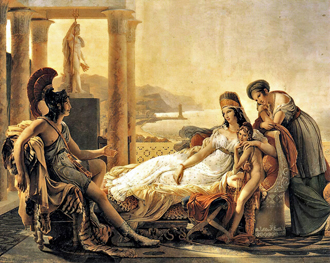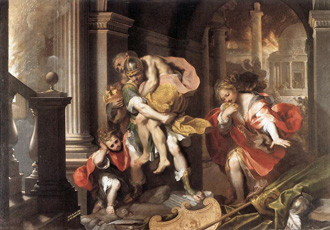Dido Queen of Carthage
Act II Scene i
Location: The Court of Queen Dido
This lengthy scene comprises three pieces of action. First the Trojans are reunited, after which Dido meets Aeneas for the first time and, increasingly intrigued, encourages him to recount the fall of Troy and their escape. Finally, Venus substitutes her own son Cupid, in place of Aeneas' son Ascanius, in Dido's care.
Aeneas:
Then he vnlockt the horse, and suddenly
From out his entrailes Neoptolemus
Setting his speare vpon the ground, leapt forth,
And after him a thousand Grecians more,
In whose sterne faces shin'd the quenchles fire,
That after burnt the pride of Asia.
Dido, Queen of Carthage, II.1.182-7
Trojans Reunited
As his party look upon the Carthage city walls, Aeneas is reminded of Troy, especially by a statue of Priam, late King of that city. By this means we are introduced to the sacking of Troy from which Aeneas and his companions have just escaped. Aeneas and Achates soon chance upon Ilioneus, Cloanthus, Sergestus and their party in Carthage, and, in a passage emphasising Trojan camaraderie which Marlowe has added to his source, all are overjoyed to be reunited.
Aeneas Recounts the Fall of Troy
Dido enters and meets Aeneas for the first time. Aeneas is initially downhearted, claiming his "fortune's meane, too meane to be companion to a Queene" [II.1.88-9]. But Dido is firmly persistent, and perhaps in a sign of things to come, orders an attendant to fetch some of her dead husband's clothes for the storm-ravaged Aeneas to change into. She is also keen to hear a first-hand account of the fall of Troy, and quickly persuades Aeneas to recount his "wo(e)full tale".

Marlowe takes Aeneas' account from Book II of the Aeneid, but shortens it significantly, and adds the occasional comment from a captivated and sympathetic Dido to break up the narrative. "Ah, how could poore Aeneas scape their hands?" [II.1.220]. Is there here, perhaps, the first shoots of love interest, even before the intervention of Cupid?
Aeneas describes how Troy had withstood the Grecian siege. The attackers were on the verge of giving up when they conceived the ploy of the wooden horse. King Primus falls for the trick, accepts the gift, and even "enforc'd a wide breach" in the walls to get the large horse into the city. Later that night, with the Trojans sound asleep after a night of banqueting and wine, Pyrrhus (bent on revenge for his father Achilles' death) and his fellow Greeks emerge from their hiding place and slaughter the Trojans.
Not all the detail in Aeneas' narration derives directly from . Marlowe adds a few gory details of his own (the kind of thing that seemed popular with an Elizabethan audience), particularly [II.1.191-9] ("Young infants swimming in their parents bloud,..." etc.) and the description of King Priam's violent end at the hands of Pyrrhus in front of his wife Hecuba [II.1.244-54]. Part of this last Marlovian addition is also perhaps the subject of some Shakespearean remembrance in Hamlet's famous Player's Speech.
The Escape From Troy
Dido is enthralled with the tale, asking how Aeneas himself escaped the Grecian slaughter. It was Venus who "conuaid me from their crooked nets and bands" [II.1.222], intervening not for the first time to save her son in the heat of battle. Aeneas recounts that he "got my father on my backe, this yong boy [Ascanius] in mine armes, and by the hand led faire Creusa, my beloued wife" [II.1.265-7] whilst Achates cleared a path for their escape through the Greek soldiers with his sword. Alas, Aeneas confesses that he "lost" his wife as they were forced to flee in this fashion. Thus Marlowe may be painting the Trojan in a slightly less sympathetic light than did , who at least had Aeneas desperately scouring the burning city in search of his lost wife. Alternatively, it may just be dramatic economy.

Aeneas and his companions finally board their ship to escape Troy, and he finishes his account with a description of his fruitless attempts to save Cassandra and Polyxena. Cassandra he finds "sprauled in the streetes" [II.1.274] and is moved to bear her to his ship, but was "forst to let her lye" when "suddenly the Grecians followed vs" [II.1.278-9]. Polyxena calls to be saved from the shore once they are aboard; Aeneas dives into the sea but before he can get there she is taken, "and after by that Pirrhus sacrifizde" [II.1.288]. Both these details are suggested by Ovid rather than , and embellished dramatically by Marlowe.
The conclusion of Aeneas' report is greeted with a barrage of questions that Marlowe uses to tie up a few loose ends, including mention of how Helen betrays her lover Diphobus (successor to Paris in this role). Dido is moved to disgust, wishing "that ticing strumpet [Helen had] nere been borne!" [II.1.300]. She suggests some "pleasing sport" to cheer them all up after "these melancholly thoughts" [II.1.303], and everyone heads off leaving Ascanius on stage alone.
Venus Substitutes Cupid for Ascanius
Venus and Cupid take this opportunity to sneak in "at another door" and abduct Aeneas' son. Venus takes Ascanius to a "groue, amongst greene brakes" [II.1.316-7] where he will be kept safe, and instructs her own son Cupid to take his place. Her plan is to have Cupid make Dido fall in love with her son Aeneas to ensure his safety. explained that Venus feared that Juno (whose favoured city was Carthage) would harm Aeneas in her attempts to gain revenge on her husband Jupiter. Marlowe simply has Venus speculate that either a love-struck Dido will "repaire [Aeneas'] broken ships, victuall his Souldiers, giue him wealthie gifts, and he at last depart to Italy, or els in Carthage make his kingly throne" [II.1.328-30].